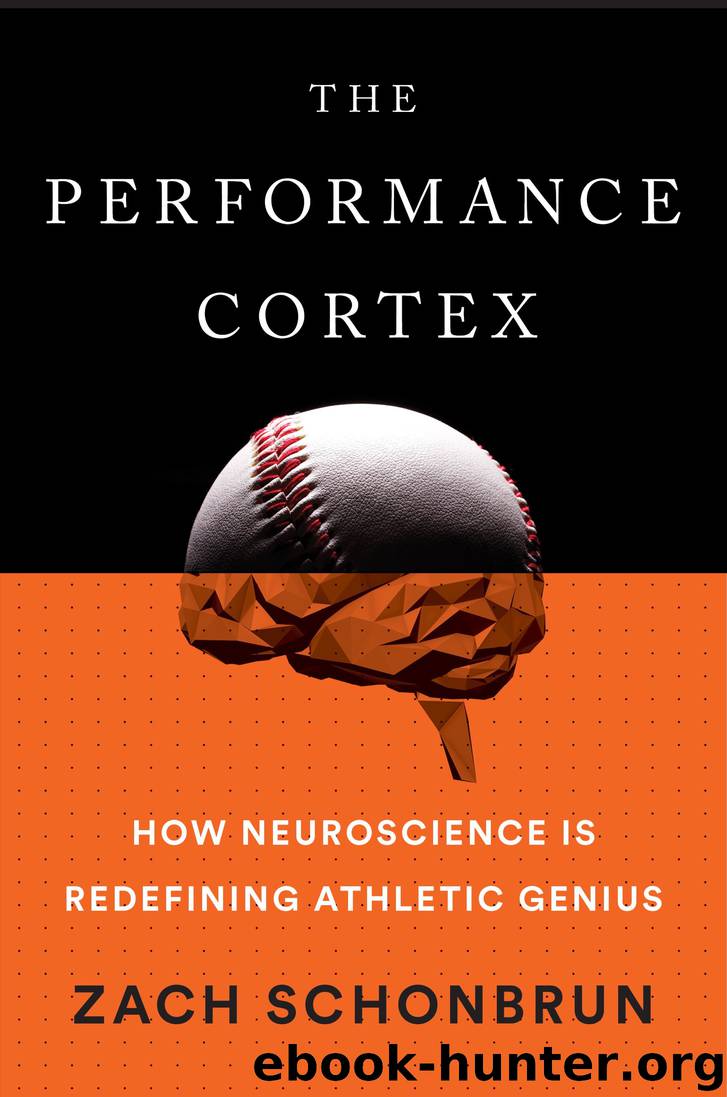The Performance Cortex by Zach Schonbrun

Author:Zach Schonbrun
Language: eng
Format: epub
Publisher: Penguin Publishing Group
Published: 2018-04-17T04:00:00+00:00
* * *
—
After more than two hard-fought years, deCervo had established relationships with almost every team in Major League Baseball. They had collected a full season’s worth of data from two franchises, and signed contracts with another three, not including a professional team in Korea. They expected that at least three organizations would be utilizing their products throughout the upcoming Spring Training, with the hope that a longer-term connection might follow. Only two years earlier, Jason had presented one of his early EEG and fMRI papers at Sloan to the snickers of some Major League scouts, who were exhibiting their new approaches to advanced analytics. “They were talking about regression models and that kind of stuff they were doing, in the ‘Moneyball’ vein,” Jason said. He had asked them if they were curious about digging down even further, to the cognitive level, to extract what exactly it was that might be generating that wins-above-replacement number or strikeout-to-walk ratio. “Most guys looked at me like I was crazy. They were like, ‘Nah, we don’t need to drill down to that level,’” he said. “I’m like, OK. I’ll see you in 10 years.”
But the company’s viability remained uncertain. They had not yet seemed to convince teams that the pathway to a competitive advantage in baseball was through the brain. It was even fair to wonder how far they were drifting from the empiricism that set them apart. Neuromonitoring still distinguished them, but their correspondences at the Winter Meetings seemed to be pushing them toward the video game model. The marketplace was starting to dictate the product offering.
“Teams will often dictate what they want,” one National League performance director told me. “They made an assessment tool that I think is scientifically valid, but there are caveats. They’ve had to gamify a lot of aspects, to appeal to a new generation, to players.” The cogency of the data deCervo was offering would not matter as much as a usable, appealing framework.
It was hard not to be reminded of the comments that John Krakauer gave at the end of the Santa Fe workshop. He can appreciate the tacit wisdom of professional coaches and athletes, who have never needed to know that engagement of their fusiform gyrus is what allows them to swing at baseballs at the right time. That knowledge has never been necessary in order to be able to do it. Now that science is trying to intrude on their space, there is pushback. Sports have thrived largely ignorant of academic analysis. Hockey players smoked in the locker room at halftime and baseball players scoffed at lifting weights. Some of that, unquestionably, has changed, but a yawning gulf remains: “How do we reconcile all the buried knowledge of sport science and the boring work being done in laboratories?” Krakauer asked.
There are doubts that coaches know the most efficient practice methods, just as there are doubts that motor laboratories can produce useful breakthroughs while conducting tedious experiments on mostly white male undergraduates. “This is not working,” said Xavi Schelling, the director of performance for the San Antonio Spurs.
Download
This site does not store any files on its server. We only index and link to content provided by other sites. Please contact the content providers to delete copyright contents if any and email us, we'll remove relevant links or contents immediately.
| Administration & Medicine Economics | Allied Health Professions |
| Basic Sciences | Dentistry |
| History | Medical Informatics |
| Medicine | Nursing |
| Pharmacology | Psychology |
| Research | Veterinary Medicine |
Tuesdays with Morrie by Mitch Albom(4784)
Yoga Anatomy by Kaminoff Leslie(4363)
Science and Development of Muscle Hypertrophy by Brad Schoenfeld(4136)
Bodyweight Strength Training: 12 Weeks to Build Muscle and Burn Fat by Jay Cardiello(3970)
Introduction to Kinesiology by Shirl J. Hoffman(3770)
How Music Works by David Byrne(3270)
Sapiens and Homo Deus by Yuval Noah Harari(3071)
The Plant Paradox by Dr. Steven R. Gundry M.D(2620)
Churchill by Paul Johnson(2587)
Insomniac City by Bill Hayes(2558)
Coroner's Journal by Louis Cataldie(2479)
The Chimp Paradox by Peters Dr Steve(2386)
Hashimoto's Protocol by Izabella Wentz PharmD(2375)
The Universe Inside You by Brian Clegg(2133)
Don't Look Behind You by Lois Duncan(2132)
The Immune System Recovery Plan by Susan Blum(2058)
Endure by Alex Hutchinson(2028)
The Hot Zone by Richard Preston(2019)
Woman: An Intimate Geography by Natalie Angier(1939)
